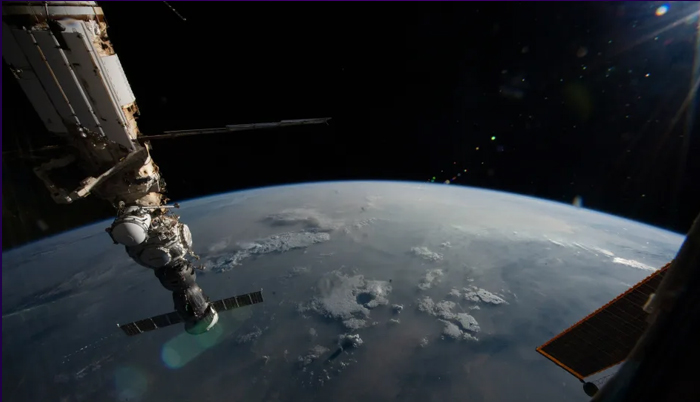![]() Home > Space & Science
Home > Space & Science
Scientists May Have A Solution To The International Space Station's Fungus Problem

NASA
![]() September 11th, 2023 | 13:39 PM |
September 11th, 2023 | 13:39 PM | ![]() 1450 views
1450 views
ENGADGET
Biofilms can clog filters in water processing systems and potentially cause illness.
Clogs in water recovery systems on the international space station have been so backed up that hoses have had to be sent back to Earth for cleaning and refurbishing. This is thanks to the build up of biofilms: a consortium of microorganisms that stick to each other, and often also to surfaces — the insides of water recover tubing, for instance. These microbial or fungal growths can clog filters in water processing systems and make astronauts sick.
So space, like Earth, has a germ problem – so what? Because biofilms can compromise the integrity of and damage equipment, including space suits, recycling units, radiators and water treatment facilities, it can cost space agencies loads of money to replace affected materials. For the full year of 2023, NASA has dedicated a whopping $1.3 billion as part of its budget to resupply its cargo missions to the ISS. Preventing microbial growth in encapsulated space missions will be especially critical for long-haul journeys to places like the moon or Mars, where a quick return to Earth for repairs or treatment of sick astronauts is less feasible.
In a cross collaboration between researchers at the University of Colorado, MIT and the NASA Ames Research Center, researchers studied samples from the space station using a specific and well-understood gram-negative kind of bacteria. The scientists also joined forces with experts at LiquiGlide, a company run by MIT researcher Kripa Varanasi that specializes in “eliminating the friction between solids and liquids.” The multidisciplinary study found covering surfaces with a thin layer of nucleic acids prevented bacterial growth on the ISS-exposed samples.
The scientists concluded that these acids carried a slight negative electric charge that stopped microbes from sticking to surfaces. It's worth noting though, that the bacteria were up against a unique physical barrier as well as a chemical one: testing surfaces were etched into "nanograss." These silicon spikes, which resembled a tiny forest, were then slicked with a silicon oil, creating a slippery surface which biofilms struggled to adhere to.
Applying this specific method of covering surfaces with nucleic acids to prevent biofilm buildup showed that in the terrestrial samples, microbial formation was reduced by about 74 percent. Surprisingly the space station samples showed an even more drastic reduction of about 86 percent. However, one recommendation the team has made, based on these initial results, is that longer-duration tests should be carried out on a future mission. Pamela Flores, a microbiology expert at the University of Colorado who participated in the study said that, “We don’t know for how long it will be able to keep up this performance,” in a statement. “So we definitely recommend a longer time of incubation, and also, if possible, a continuous analysis, and not just end points.”
Source:
courtesy of ENGADGET
by Malak Saleh | Reporter
If you have any stories or news that you would like to share with the global online community, please feel free to share it with us by contacting us directly at [email protected]